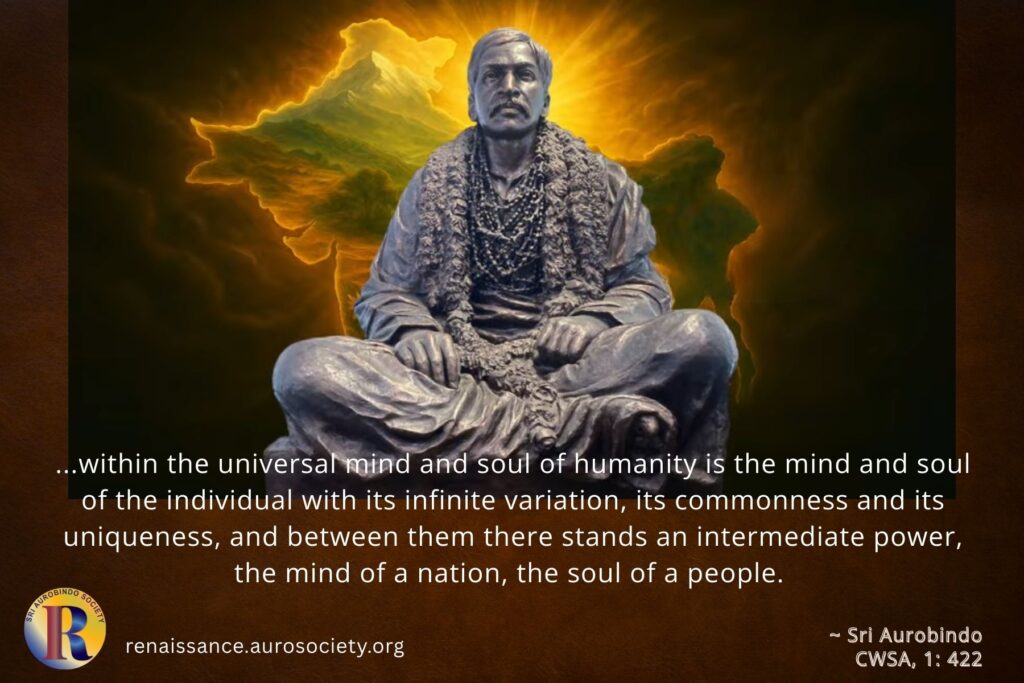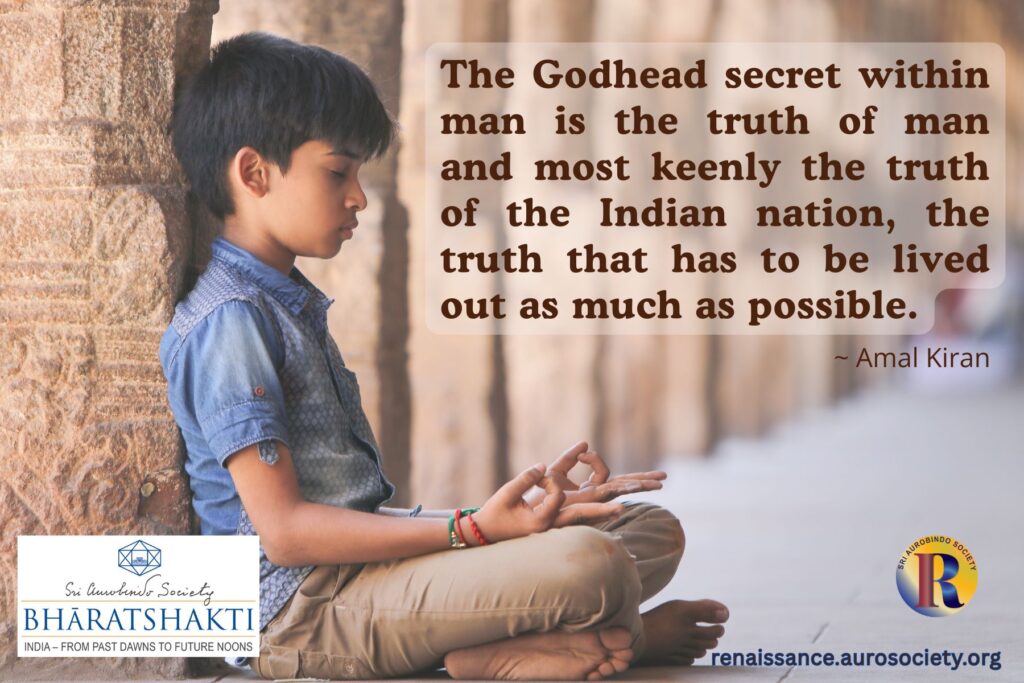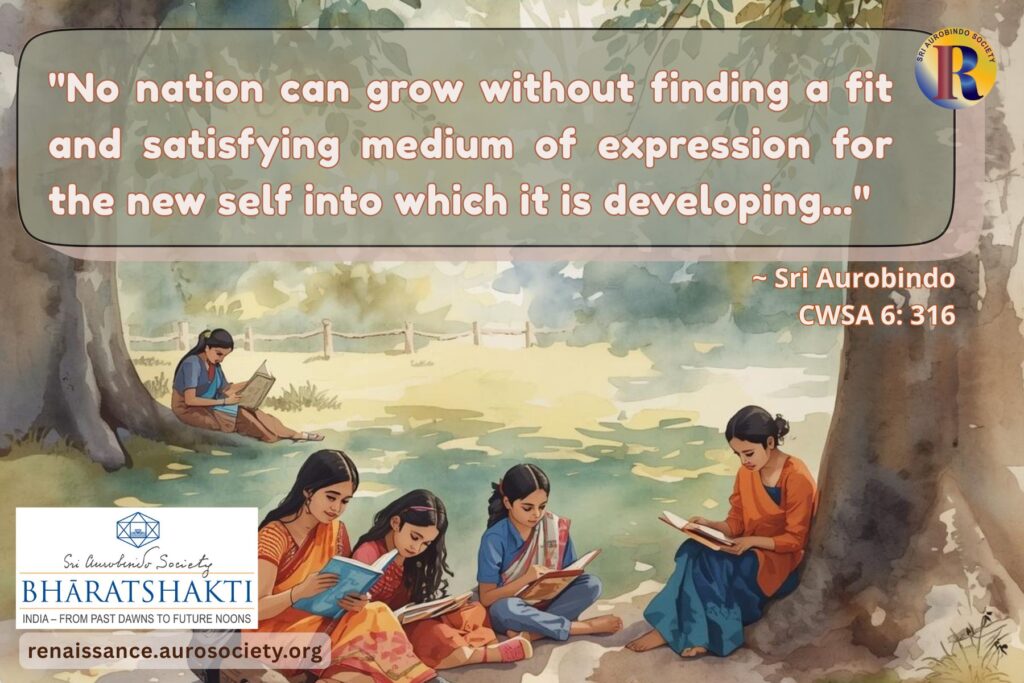Volume III, Issue 3
Author: Sri Aurobindo and the Mother
Editor’s note: We feature a few relevant passages from the works of Sri Aurobindo and the Mother to highlight the multilayered truth about war as a necessary means employed by Nature for its evolutionary purposes. As the Mother reminds us war will cease to exist when it becomes unnecessary to the evolution of the earth, for which man has to undergo a spiritual transformation.

Disciple: Are all these wars necessary for the evolution of the earth?
At a certain stage of human development, wars are inevitable. In prehistoric times the whole of life was a war; and to the present day human history has been one long history of wars. Wars are the natural result of a state of consciousness dominated by the struggle for life and egoistic aggressiveness.
And at the present time, in spite of some human efforts towards peace, there is, as yet, nothing to assure us that war is no longer an inevitable calamity. Indeed, does not a state of war, open or otherwise, exist at this moment in many parts of the world?
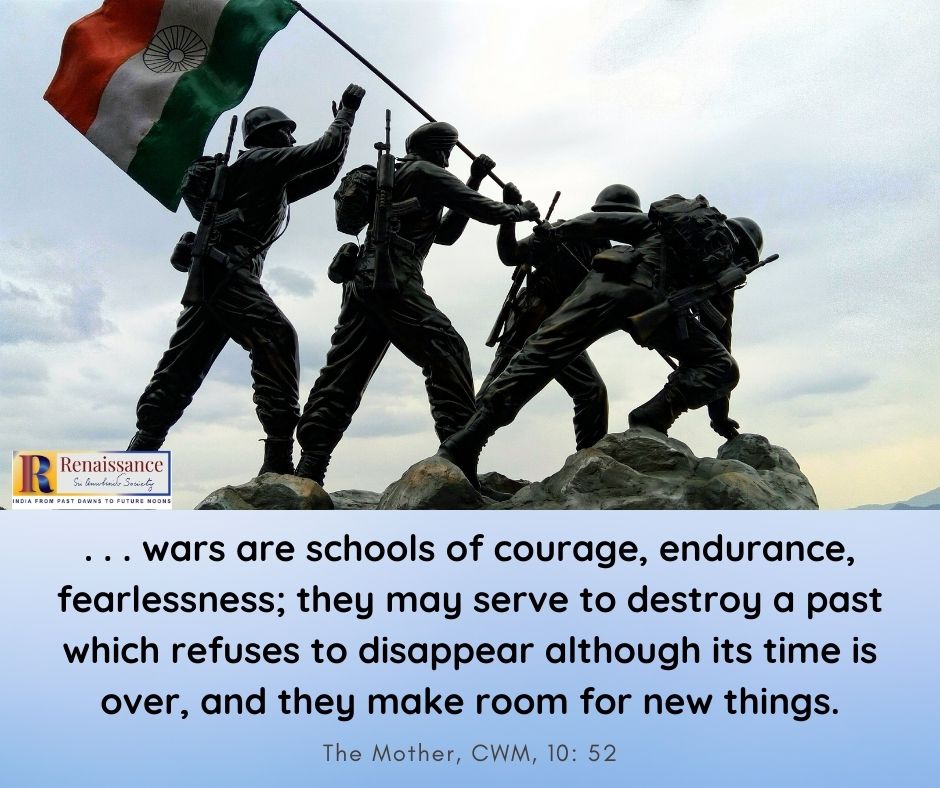
Besides, everything that happens on earth necessarily leads to its progress. Thus wars are schools of courage, endurance, fearlessness; they may serve to destroy a past which refuses to disappear although its time is over, and they make room for new things.
Wars can, like Kurukshetra, be a way to rid the earth of a domineering or destructive race so that justice and right may reign. They can, through the presence of danger, shake the apathy of a too tamasic consciousness and awaken dormant energies.
Finally they can, by contrast, and because of the horrors that accompany and follow them, drive men to seek an effective way to make such a barbarous and violent form of transformation unnecessary.
For everything that is unnecessary to the evolution of the earth automatically ceases to exist.
Also read:
Something of the Stuff of the Hero and of the Titan
Disciple: You have written: “They [wars] may serve to destroy a past which refuses to disappear although its time is over, and they make room for new things.” Now that the Supermind has descended upon earth will war be necessary to change the present state of the world?
All will depend on the receptivity of nations. If they open widely and quickly to the influence of the new forces and if they change rapidly enough in their conceptions and actions, war may be avoided. But it is always threatening and always in abeyance; every error, every darkening of the consciousness increases this threat.
And yet in the last analysis everything really depends on the Divine Grace and we should look towards the future with confidence and serenity, at the same time progressing as fast as we can.
~ The Mother, CWM, Vol. 10, pp. 52-53

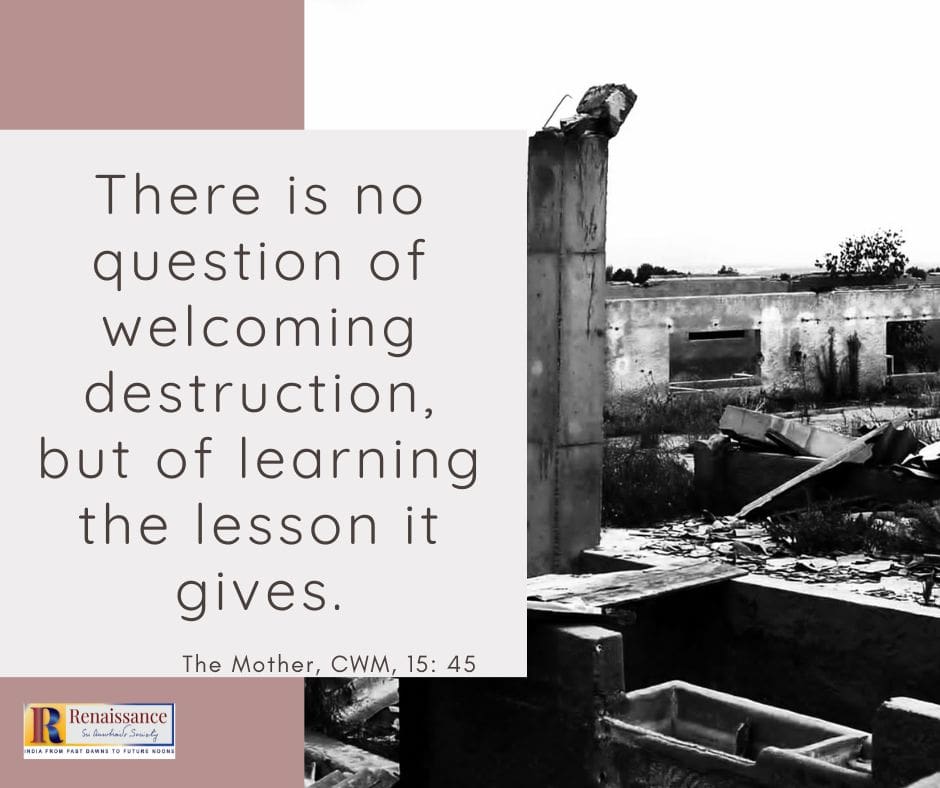
Disciple: You write in Your Conversations: “Each time that something of the Divine Truth and the Divine Force comes down to manifest upon earth, some change is effected in the earth’s atmosphere.” (CWM, Vol. 3, p. 79)
(1) Is this change always violent and destructive, such as a revolution or a war?
Not necessarily. What expresses itself as a war or a revolution is the resistance in the human consciousness to the New Force. When the resistance is less, everything takes place harmoniously.
(2) And is the converse always valid: if there is a war or a revolution, is it the sign of a descent of the Truth?
Not necessarily. Human folly takes advantage of the slightest cause to manifest itself.
~ The Mother, CWM, Vol. 16, p. 329

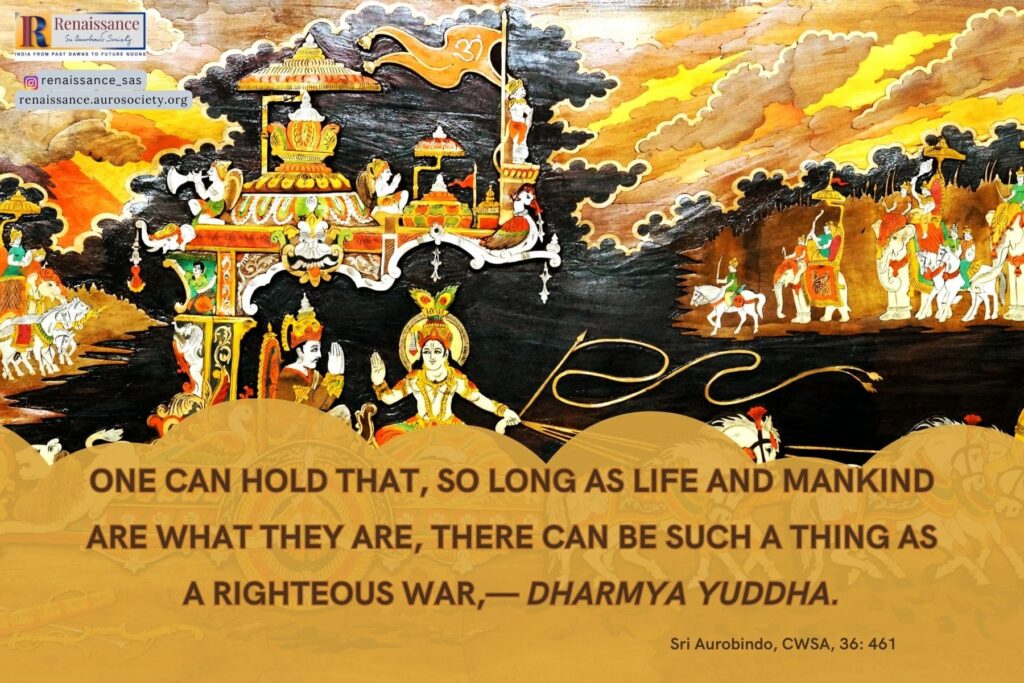
So long as war does not become psychologically impossible, it will remain or, if banished for a while, return.
War itself, it is hoped, will end war; the expense, the horror, the butchery, the disturbance of tranquil life, the whole confused sanguinary madness of the thing has reached or will reach such colossal proportions that the human race will fling the monstrosity behind it in weariness and disgust.
But weariness and disgust, horror and pity, even the opening of the eyes to reason by the practical fact of the waste of human life and energy and the harm and extravagance are not permanent factors; they last only while the lesson is fresh. Afterwards, there is forgetfulness; human nature recuperates itself and recovers the instincts that were temporarily dominated.
A long peace, even a certain organisation of peace may conceivably result, but so long as the heart of man remains what it is, the peace will come to an end, the organisation will break down under the stress of human passions.
War is no longer, perhaps, a biological necessity, but it is still a psychological necessity; what is within us, must manifest itself outside.
. . . Only when man has developed not merely a fellow-feeling with all men, but a dominant sense of unity and commonalty, only when he is aware of them not merely as brothers,—that is a fragile bond,—but as parts of himself, only when he has learned to live not in his separate personal and communal ego-sense, but in a larger universal consciousness can the phenomenon of war, with whatever weapons, pass out of his life without the possibility of return.
~ Sri Aurobindo, CWSA, Vol. 25, pp. 610-611

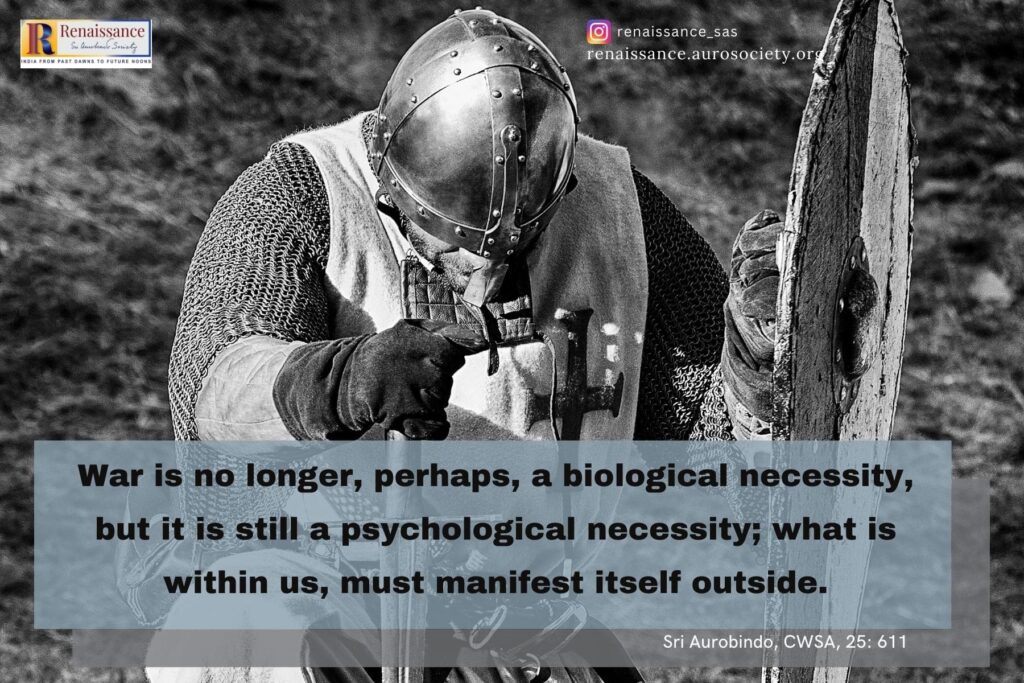
Don’t miss:
The Conquest of India by the English
War is physically an evil, a calamity; morally it has been like most human institutions a mixture, in most but not all cases a mixture of some good and much evil: but it is sometimes necessary to face it rather than invite or undergo a worse evil, a greater calamity.
One can hold that, so long as life and mankind are what they are, there can be such a thing as a righteous war,—dharmya yuddha.
No doubt, in a spiritualised life of humanity or in a perfect civilisation there would be no room for war or violence,—it is clear that this is the highest ideal state. But mankind is psychologically and materially still far from this ideal state.
To bring it to that state needs either an immediate spiritual change of which there is no present evidence or a change of mentality and habits which the victory of the totalitarian idea and its system would render impossible; for it would impose quite the opposite mentality, the mentality and habits on one side of a dominant brute force and violence and on the other a servile and prostrate non-resistance.
Sri Aurobindo, CWSA, Vol. 36, pp. 461-462

~ Design: Beloo Mehra

